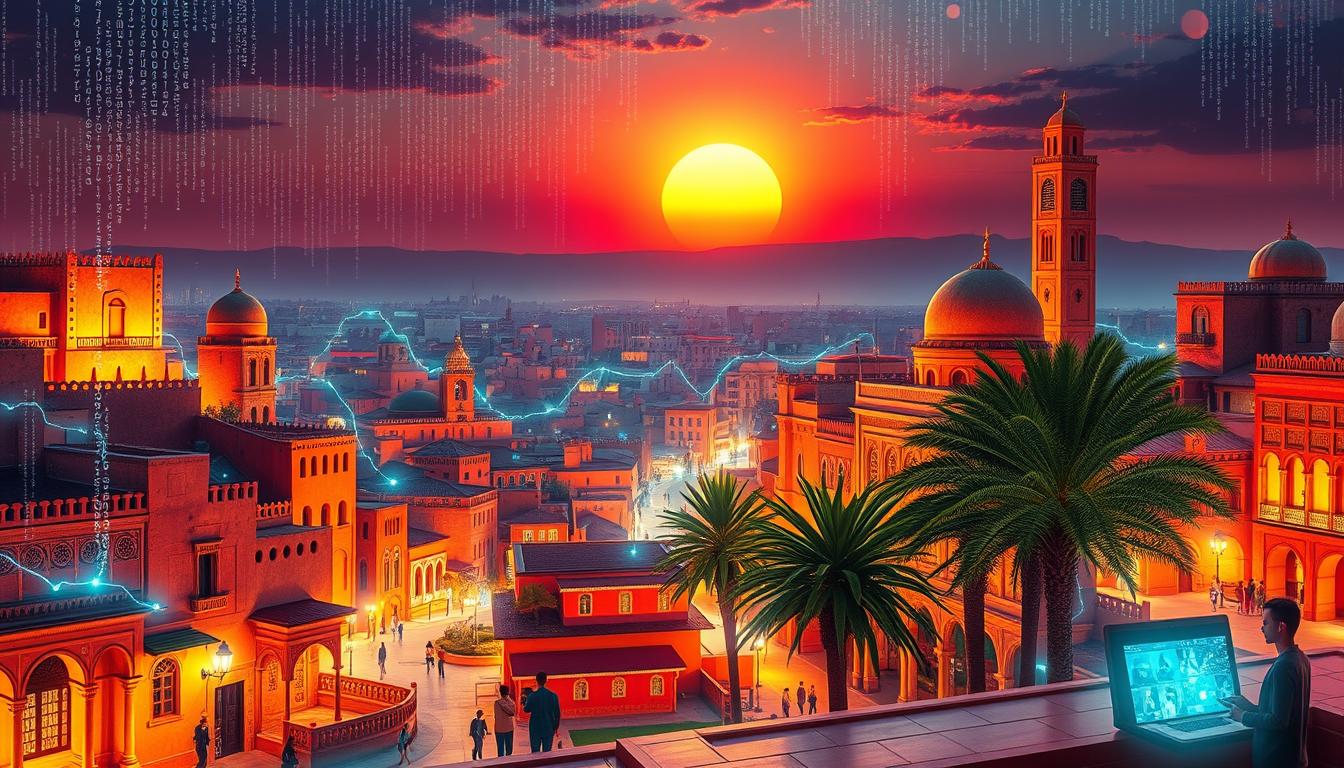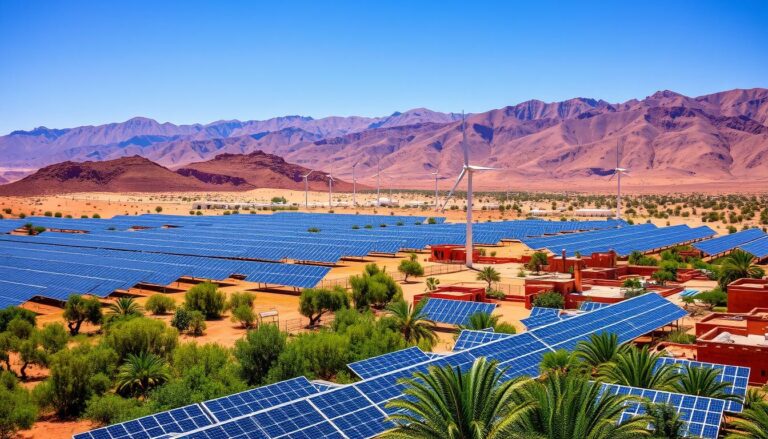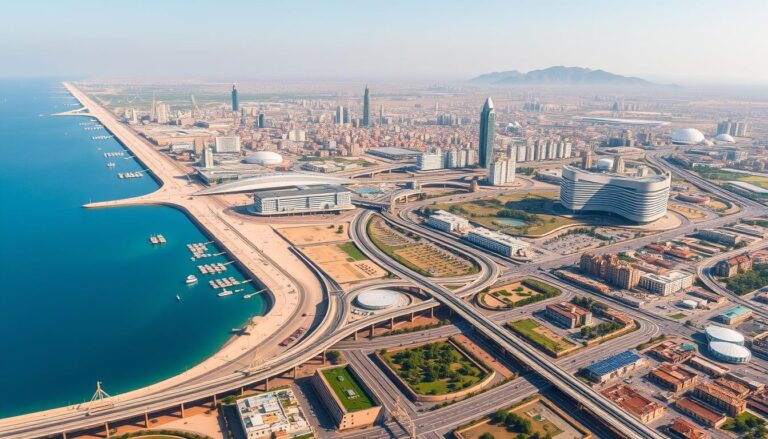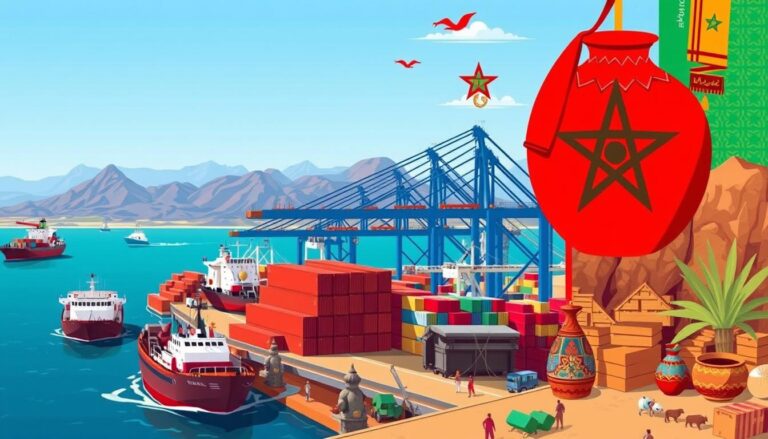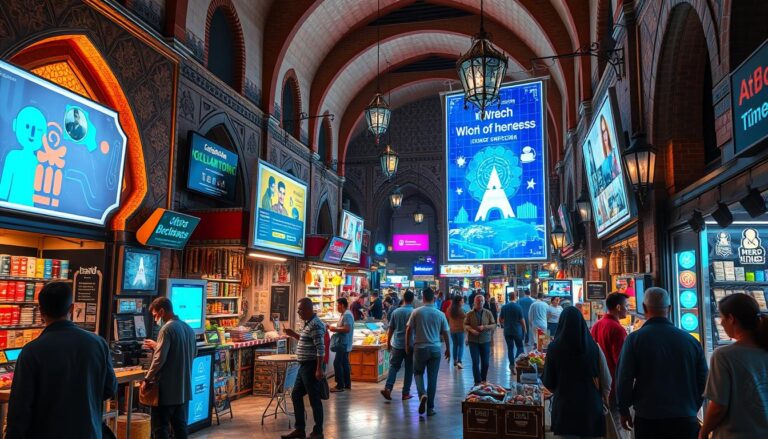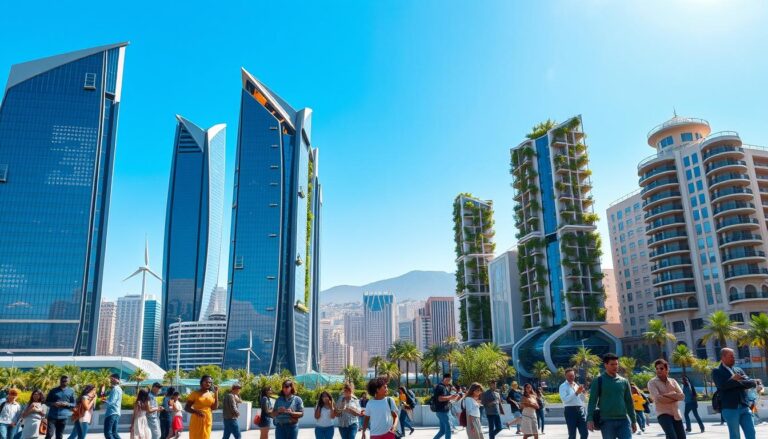Imagine Morocco’s digital leap changing the game for its economy. The Moroccan Digital Strategy 2030, unveiled by Prime Minister Aziz Akhannouch, is a big step forward. It aims to boost Morocco’s economy through digital means. The country is becoming a digital leader in Africa, focusing on digital progression Morocco and economic development Morocco.
Morocco leads with a high 93% internet penetration rate, ranking fourth in MENA by the European Center for Digital Competitiveness in 2020. The country has made big strides, thanks to investments and reforms. For example, the World Bank backed $500 million in 2020 for digital and financial inclusion. Morocco aims to digitize 2,700 government procedures by 2022, improving public services.
Big tech names like Oracle see Morocco’s potential. They opened a new R&D center in 2022. Morocco’s efforts, like the General Directorate of National Security’s win in the “African Excellence E-Government Award,” show its digital progress. The Digital Development Agency, started in 2017, leads these efforts.
Morocco’s plan is all-encompassing, with vocational training and partnerships with companies like Orange. It also has top-notch training centers like 1337 in Khouribga. These steps aim to prepare a skilled workforce for the online business Morocco future. This digital transformation is about inclusive, sustainable growth, bridging urban and rural gaps.
Introduction to Morocco’s Digital Economy
The prime minister’s words at Gitex Africa 2024 showed Morocco’s drive to lead Africa’s digital shift. The country wants to become a top spot for innovation.
Morocco has grown a lot in its digital economy. Many efforts have boosted its digital scene. In 2012, the Digital Morocco Plan launched 377 websites and helped create 547 online public services. This increased remote access to government services by 18%.
The Master Plan for Digital Transformation in 2018 aimed to improve online services. It made data sharing between services smoother, helping Morocco’s digital growth.
From 2018 to 2020, the Open Government plan saw an 84% success rate. It made public data more accessible, improved budget clarity, and built new administrative tools. This pushed the Moroccan tech industry forward.
The Maroc Digital 2020-2025 plan wants Morocco to be a digital leader in the Middle East and Africa. It plans to speed up digital projects, encourage innovation, and fight social exclusion. This will help human development.
The government plans to digitize all administrative tasks by 2030. They aim for 100% of relevant structures to be connected through a unified interface. They also want to use e-signatures widely in public institutions. This shows Morocco’s big plans for its digital future.
Government Initiatives and Implementations
The Moroccan government is deeply committed to digital transformation. They have launched many initiatives to improve the country’s digital scene. These efforts are part of the Moroccan government digital agenda, focusing on growth, accessibility, and innovation.
The Moroccan Digital Strategy 2030
The Moroccan Digital Strategy 2030 is a plan for a strong digital industry. It has a budget of USD 1.1 billion. The goal is to digitize all administrative tasks by 2030.
They aim to train 100,000 young people in digital fields each year. They also want to employ 240,000 people in the digital sector. By 2027, they hope to triple the number of digital graduates. They plan to create over 130,000 jobs through agreements.
Previous Strategies and Their Impact
The history of Moroccan digital policies starts with the Competitive Morocco Strategy 1996. Then came e-Maroc 2010 and the Digital Morocco Plan (2009-2013). The 2005 e-Maroc 2010 Strategy introduced portals like service-public.ma.
The Digital Morocco Plan launched 89 e-government projects. This made it easier to access administrative services online. The Maroc Digital 2020-2025 strategy aims to make Morocco a leader in digital public services.
Public-Private Partnerships
The success of IT development in Morocco depends on public and private sector collaboration. Companies like Orange have been key players. These partnerships help fund projects and share knowledge.
They drive innovation in the digital ecosystem. This has helped expand digital payment systems. Now, 31% of rural areas have access to digital payments, with 19 providers.
In summary, the Moroccan government’s digital agenda is ambitious. It aims for sustainable growth and inclusivity through well-planned strategies and partnerships.
Role of Startups and Entrepreneurship
Morocco is quickly becoming a hub for new businesses thanks to its digital growth. The focus on digital change has made it easier for startups to thrive. With lots of internet users and government help, young business owners can start and grow their companies.
Startup Ecosystem in Morocco
Morocco has a strong startup scene thanks to many support programs. There are 74 active and planned programs, like incubators and co-working spaces. For example, Technopark, run by MITC, has helped over 1,100 companies since 2001.
Big companies like OCP are also helping startups grow. They have programs like the Seed-Stars Startup Competition. Banks like Attijariwafa Bank and BMCE Bank of Africa are also supporting startups with money and help.
Prominent Moroccan Startups
Successful Moroccan startups show the country’s potential. Companies like Hmizate, Chari, and Kareem are leading in the digital world. They prove Morocco can innovate and help its economy grow.
In short, startups and entrepreneurship are key to Morocco’s digital economy. With the right support, Morocco is set for economic growth and success.
E-commerce in Morocco
The digital economy in Morocco has changed how people shop online. More people are buying things online, thanks to digital marketplaces. In 2020, e-commerce transactions rose by 46% from 2019, showing how fast online shopping is growing.
Markets like electronics, fashion, and beauty are seeing more online sales. Big names like Amazon and local start-ups like Chari are leading the way. Chari, for example, became worth $100m in 2022 with new payment options.
E-commerce in Morocco has seen big jumps in 2021. There was a 48% increase in online transactions and a 30% rise in spending. But, only 17% of adults use digital payments, and just 1.6% buy things online. Visa and Interbank Monetary Center are working on better digital payments.
During the pandemic, Morocco saw a huge increase in e-commerce sites. Now, there are 1000 sites, up from 700. This growth is good for businesses and shoppers, thanks to Morocco’s good roads.
Online shopping in Morocco offers more choices and better prices. But, it might also lead to fewer jobs in traditional stores. Finding a balance is key for Morocco’s digital economy to grow well.
Internet Connectivity and Infrastructure
Morocco has made big strides in digital technology thanks to its strong internet and tech infrastructure. It has an impressive 90.7% internet penetration rate. This makes it a top digital hub in Africa and a key link between Africa and Europe.
High Internet Penetration Rates
Morocco has worked hard to make the internet accessible to everyone. In 2023, African Infrastructure Investment Managers (AIIM) teamed up with Morocco’s N+ONE Data Centres for a $90 million investment. This move helped build advanced data centers.
This focus on internet access has paid off. Morocco now has a 90.7% internet penetration rate. This connects more people to the world and its information.
Development of IT Services and Skills
The Moroccan government has made a big push for digital literacy and IT skills. Programs like e-Morocco 2010 and Digital Morocco 2020 have helped. They aim to make Morocco a digital leader in the region.
The National Digital Development Strategy 2020-2025 is another example of this commitment. It aims to improve online public services and digital inclusion. Morocco also focuses on making government services more efficient and supporting small businesses with digital tools.
The data center market in Morocco is expected to grow a lot. By 2028, it will see investments of $51.0 million, growing at 11.18% annually. This shows Morocco’s plan to boost its digital infrastructure and use new technologies like AI and IoT.
Technological Advancements and Innovations
Morocco is leading the way in digital transformation. The Digital Morocco 2025 strategy aims to speed up digitization in many areas. Oracle’s new R&D facility and the digitization of over 2,700 admin processes show Morocco’s quick progress.
Recent Technological Developments
In recent years, Morocco has seen a big leap in tech innovation. Oracle set up an R&D facility, and many admin processes were digitized. The country has also built tech parks and innovation hubs like the Casablanca Technopark and Rabat Technopolis.
These places help startups and encourage new ideas in IT, green tech, and biotech.
- Oracle’s new R&D facility in 2022 is a big step for Morocco’s tech scene.
- Digitizing over 2,700 admin processes has made government work smoother.
- Casablanca Technopark and Rabat Technopolis are key for Morocco’s growth.
Impact on Various Sectors
Digital progress in Morocco is changing many sectors. It has improved cybersecurity and digital sovereignty. Energy, education, and industry are seeing big improvements:
- Energy Sector: Morocco wants to get 52% of its energy from renewables by 2030, showing its commitment to green tech.
- Education and Skills Development: Places like 1337 in Khouribga offer top-notch programming and computer science courses, boosting digital skills.
- Industrial and Economic Growth: Morocco is working hard to protect IP rights through the Moroccan Office of Industrial and Commercial Property (OMPIC), helping both local and international investors.
These efforts not only drive innovation but also help the economy grow. They are pushing Morocco towards a future full of technology.
Impact of Digital Transformation on Public Services
Morocco’s digital transformation has changed its public services a lot. By using digital public solutions Morocco, the country has made things easier and more accessible for everyone. A great example is the ID card program by the General Directorate of National Security.
This program has made e-government Morocco a role model for others. It shows how digital technology can make tasks simpler and safer. This move towards digital solutions is happening in many areas of Morocco.
Thanks to digital public solutions, services in Morocco are getting better. People can now deal with government faster and more easily. This makes it simpler for everyone to get the services they need.
Also, e-government Morocco makes services more open to everyone. Digital IDs help even those who were left out before. This change helps more people get involved in public life.
Morocco’s push for digital transformation is in line with the world. Countries in Sub-Saharan Africa have also seen a big jump in internet use. This shows that digital change is a big goal everywhere, aiming to make services better.
In short, digital transformation has made a big difference in Morocco’s public services. By using new digital solutions, the country keeps getting better at managing things. As these solutions grow, more areas will benefit, making Morocco a top name in digital governance.
Challenges and Opportunities
Morocco’s digital journey has seen both hurdles and chances for growth. A big challenge is making technology and digital services available to everyone. Despite a 3.4% increase in real output in 2023, per capita consumption is still below pre-pandemic levels. This shows the economic gaps that exist.
The Moroccan economy lost 200,000 jobs in rural areas in 2023 despite economic acceleration, underscoring the need for digital inclusivity across all demographics.
However, the digital economy in Morocco holds great promise. Foreign direct investment has surged, offering new opportunities. Small and micro-enterprises are the backbone of the private sector but face challenges in scaling up. This highlights the need for innovation and capacity building.
Morocco has made strides in digital competitiveness, moving up from 82nd in 2014 to 110th in 2018 in e-government rankings. It gained four places in 2020. This puts Morocco 8th in digital competitiveness in North Africa and the Middle East. Digital efforts have also made processes more efficient, saving time and money.
Yet, the main task is to improve governance and expand digital infrastructure. Success in public administration has helped businesses, but there’s more to achieve. The digital economy in Morocco is set to flourish if these strategic opportunities are seized.
- Continuing development of digital infrastructures
- Enhancing legal frameworks for digitization
- Capacity building in digital skills
- Boosting productivity through innovation
Conclusion
Morocco is deeply committed to growing its digital economy. It has a clear plan, better infrastructure, and focuses on innovation and entrepreneurship. The Moroccan Digital Strategy 2030 is a key part of this effort.
Public-private partnerships and a thriving startup scene are also important. They help Morocco develop its digital economy in a sustainable way.
The country has made big strides in internet and IT infrastructure. This has led to more people using the internet and more online shopping. These changes have brought in a lot of international investment.
As Morocco keeps improving its internet and wireless technology, it’s getting closer to its digital goals. The digitization index shows the country is moving forward in a smart way.
The future of digital Morocco looks bright. The pandemic has shown how important online shopping and services are. Morocco is using these lessons to keep growing.
The country’s digital transformation has made public services better. It has also shown Morocco can adapt to new technologies. By sticking to its goals, Morocco is set to become a key player in the global digital economy.
Source Links
- The Digital Cooperation Organization
- Morocco: The Impact of the Digitization of Public Services
- Overview
- Layout 1
- World Bank Continues to Support Morocco’s Financial and Digital Inclusion Reforms
- Digital Morocco 2030: the national digital transformation strategy
- Employment by Subsidizing Businesses in Morocco: A Fantasy?
- Supporting start-ups Episode 3 – How is the Moroccan innovation ecosystem being built? – Accuracy
- Revenue of the e-commerce market in Morocco from 2020 to 2029 (in million U.S. dollars)
- Exploring Morocco’s growing e-commerce sector
- How is E-commerce transforming traditional commerce and the economy in Morocco ?
- Eye on Morocco: A promising Data Center Market in North Africa
- Digital Transformation Center Morocco | BMZ Digital.Global
- Morocco: Maximizing Economic Momentum and IP Innovation – SABA IP – Intellectual Property in the Middle East and Africa
- COVID-19: A chance to leapfrog Africa’s development via digitalization
- Digital Transformation Drives Development in Africa
- The transformation imperative: how the digital public sector is contributing to development in CEE
- Morocco’s Economy Proves Resilient but Private Sector Faces Challenges
- Plain text
- Attempt to Model the Impact of Digitalization on the Economic Growth of Morocco

The Editorial Team is a passionate group of Morocco enthusiasts dedicated to sharing the beauty, culture, and wonders of this captivating country. With diverse backgrounds and a deep love for travel, we strive to bring you engaging and informative content that inspires your Moroccan adventures. From uncovering hidden gems and sharing local insights to exploring mouthwatering cuisine and showcasing the vibrant lifestyle, our team is committed to providing you with valuable resources and exciting stories that enhance your exploration of Morocco. Join us on this journey as we celebrate the rich heritage and unforgettable experiences that make Morocco truly special.

